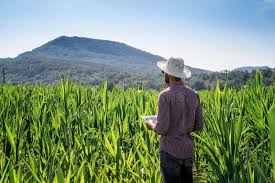Agriculture is regarded as the art and science of cultivating crops, raising livestock, provision of raw materials for agro-allied industries, and marketing of agricultural produce for man’s use. There are many branches of agriculture which, among others, include: Agricultural Economics, Crop Science, Soil Science, Animal Science, Fishery, Forestry, and Agricultural Engineering.
Agricultural Economics involves the application of economic principles in agriculture. One of the important branches of Agricultural Economics is Farm Management. This article examines the meaning and nature of Farm Management. In addition, the article also describes the scope of Farm Management.
Read Also: Disadvantages of Cross-Breeding
The Meaning Of Farm Management

Generally speaking, management is the ability of some people to compel economic progress through forceful direction and coordination of other people’s efforts. When applied to farm business, management could be seen as a practical undertaking of the farm business with respect to how to put crop and livestock husbandry to work on the farm as a means of obtaining high profit.
Farm Management is a science that deals with the proper combination and operation of production factors, including land, labour, and capital. In this age of science and technology, success in business requires the ability to harness scientific and technical knowledge.
It involves having a personal command and clear hold on the technological, commercial, and human aspects of business, which become interwoven into successful progress in business.
The idea that managers are born, not made, is erroneous and is dying. The feeling that technical and commercial competence alone can see one through does not hold either. People through the ages have realized that it is possible to develop managerial skills through training.
Most people planning to go into the farm business probably think in terms of how much profit they can make in the shortest possible time. However, the way and manner profits are arrived at are very much dependent on a good understanding of what a business really entails.
A business may be defined as any activity that involves the production, selling, or trading of needed products and services. When such activity revolves around a farm, it is a farm business.
A farmer needs to know not only how to cultivate crops and tend livestock but also how to manage the farm. Many farms consist of different sections, each devoted to the production of one kind of crop or livestock. These sections of the farm are known as enterprises.
Every farmer must face the management problem of the enterprises. The importance of farm management can manifest itself in various ways, such as detecting and finding solutions to management problems, deciding which enterprises to have, how much to produce in each enterprise, and what methods to use.
The Nature Of Farm Management

Every farmer must know and be able to do all the practical jobs connected with farming enterprises. For this practical knowledge, there is no substitute. This explains the fact that good Farm Management is often considered an art rather than a science, and this explains why some farmers fail while others succeed.
For farmers to succeed, they must also know the scientific principles of crop and livestock production, particularly in the area in which the farming is to be practiced. The soil type, diseases, weather, and seasons can be studied or obtained from an extension worker in the area.
It demands that farmers must know and use the basic business principles in accordance with which the common farm practices and scientific principles should be applied.
Farm Management is also concerned with the effective employment of socially acceptable guidelines for all levels of organization. In policy formulation and achieving results, relevant facts must be considered. It must at all times try to attain the optimum level of effectiveness and economy of operations.
To do this, human satisfaction, welfare packages, and morale boosting must be promoted. Farm Management responsibility is a continuous and living activity that must not be replaced by routines or operational techniques meant for lower-level operatives in the absence of the manager.
No matter how large an organization is, the management process must be seen as a unified process in which all the parts are interrelated and working towards a single purpose or set of objectives.
The management process is based on systematic diagnosis of the problem, finding the facts, assessing and interpreting the findings, making decisions, giving instructions, ensuring execution, and checking the results. Farm Management performance is judged by the achievement of purpose or objectives, effectiveness of operations, and, most importantly, the contentment of the farm workers.
Many people consider farming a poor man’s occupation or business. Many educated youths do not like to remain in rural areas to take up farming as their major occupation. These people do not realize the great importance of farming.
It should be noted that everybody, from the highest to the beggars on the street, depends on farmers for food. For the country to develop and move out of the poverty level, the participation of every citizen in the farming business is required.
Read Also: All about Cross-Breeding
The Scope Of Farm Management

The scope of Farm Management is as wide as the scope of Agricultural Economics itself because there is hardly any aspect of Agricultural Economics that is not relevant to Farm Management.
The broad scope of Farm Management could be viewed from its broad functions, which include: planning, organizing, directing, implementing, control, and risk management.
In order to perform these functions effectively, Farm Management involves the study of the problems of production which is a collective activity and an attempt by man to satisfy his wants; distribution which is the process of transferring goods from the producer to the consumer; consumption which is the satisfying of wants through the use of goods and services; and exchange which concerns the attempts made by man to exchange whatever he produces for the goods and services of other people.
Other areas of Farm Management include the study of financial management. This involves keeping financial records, raising funds for farm businesses, and how to make careful use of the funds.
Besides, it includes the study of the marketing of agricultural products, the study of farm inputs to ensure proper coordination of land, labour, and capital. The right quantities of these resources needed on the farm are also studied.
In general, since the ultimate goal of studying Farm Management is to make maximum profit, the study of Farm Management rests on a broad formation of the study of human nature and its most fundamental propositions that are applicable to all conditions of mankind.
In this article, the meaning, nature, and scope of Farm Management have been discussed. From these discussions, it can be concluded that the main objective of Farm Management is to ensure the proper combination and operation of production resources to bring about maximum and continuous returns to the most elementary unit of farming.
Do you have any questions, suggestions, or contributions? If so, please feel free to use the comment box below to share your thoughts. We also encourage you to kindly share this information with others who might benefit from it. Since we can’t reach everyone at once, we truly appreciate your help in spreading the word. Thank you so much for your support and for sharing!
Read Also: Broccoli Farming 101: Tips and Techniques for a Thriving Crop

